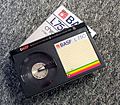Sony Corp. of America v. Universal City Studios, Inc. facts for kids
The case of Sony Corp. of America v. Universal City Studios, Inc. (1984), often called the “Betamax case”, was a big decision by the Supreme Court of the United States. This court is the highest court in the U.S. The case was about whether recording TV shows at home was against the law.
The Court decided that making copies of TV shows for "time shifting" was okay. Time shifting means recording a show to watch it later, not to sell or share. The Court said this was "fair use" and not "copyright infringement". Copyright infringement means using someone else's creative work without their permission. Fair use means you can use copyrighted material in certain ways, like for personal use or education.
The Court also ruled that companies making home video recorders, like the Betamax or other VCRs, were not doing anything wrong. This decision was a huge help for the home video market. It made it legal and safe for people to buy and use VCRs to record TV shows at home.
Contents
Understanding Copyright and Fair Use
Copyright is a legal right that protects original works of authorship, like books, music, movies, and TV shows. It gives the creator control over how their work is used. When you have copyright, others usually need your permission to copy, share, or perform your work.
However, there are exceptions. One important exception is "fair use." Fair use allows people to use copyrighted material without permission for certain purposes. These can include:
- Criticism or comments
- News reporting
- Teaching
- Scholarship
- Research
- And, as the Betamax case showed, even for personal "time shifting."
The Betamax Machine and the Lawsuit
The case got its name from the Sony Betamax, an early type of VCR. These machines allowed people to record TV programs onto videotapes. This was a new and exciting technology in the 1970s.
Movie studios, like Universal City Studios, were worried. They thought that if people could easily record TV shows, it would hurt their business. They believed that recording shows at home was copyright infringement because people were making copies of their copyrighted movies and TV programs. So, Universal City Studios sued Sony Corporation of America, the company that made the Betamax.
The Supreme Court's Decision
The lawsuit went all the way to the Supreme Court. The main question was whether recording TV shows for personal use was legal. The Court looked at how people used the Betamax. They found that most people used it to record shows they would otherwise miss, just to watch them at a different time. This was the idea of "time shifting."
In 1984, the Supreme Court made its final decision. They ruled 5-4 that time shifting for personal use was fair use. They said it did not harm the copyright holders. This ruling meant that VCRs and other home recording devices were legal. It opened the door for the huge growth of the home video industry, which eventually led to things like DVDs, streaming services, and DVRs today.
Images for kids
-
The case centered around Sony's manufacture of the Betamax VCR, which used cassettes like this to store potentially copyrighted information.
See also
 In Spanish: Sony Corp. of America v. Universal City Studios, Inc. para niños
In Spanish: Sony Corp. of America v. Universal City Studios, Inc. para niños
 | Anna J. Cooper |
 | Mary McLeod Bethune |
 | Lillie Mae Bradford |


